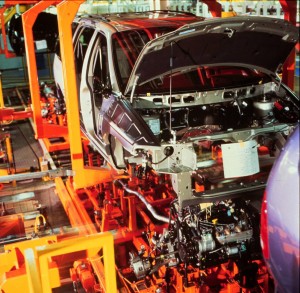
The auto industry is key to America's future economic growth, says new study.
The domestic automobile industry is an important element in innovation engine that is critical to prosperity in the U.S., suggests a new study from a Washington think tank.
America’s future depends on its ability to translate new ideas into investment, jobs, and long-term productivity growth, said Kent Hughes, director of the Science, Technology, America, and the Global Economy program at the Woodrow Wilson Center in Washington D.C., and one of the authors of the new study.
“In the debate over handling the bankruptcies of Chrysler and General Motors,” he said, “the impact on innovation and the U.S. industrial base has been largely ignored.
“The auto sector – including its parts suppliers, engineers, and related services – is a key part of our innovation system that encompasses much more than the goal of producing new, fuel-efficient cars,” Hughes said.
“We need an even stronger industrial base so that we can pay our way in the world, instead of borrowing hundreds of billions of dollars from China, Japan, Germany, and many oil-rich states. It is hard to envision America having the capacity to produce hundreds of billions of dollars of manufactured goods in the future without a strong, innovative automotive sector,” he said.
In fact, visitors to the Telematics 2009 conference in Novi., Mi., this week, said automakers are pushing for new futures that could help spark sales.
“By 2016, the majority of consumers will consider in-vehicle connectivity and the ability of driver/passenger-centric, contextual information as important as traditional automobile features such as high safety and fuel efficiency standards,” says Thilo Koslowski vice president and automotive practice leader at the consulting firm of Gartner Inc. of Stamford, Conn.
“The continued rise of connected consumer devices, such as smartphones and mobile Internet devices, will increase consumer expectations for always-on data availability throughout their work and home, and when being mobile – including when driving,” Kosowski said.
GM vice chairman Robert Lutz made the same point last week when he said there seems to be a growing realization in Washington D.C., or at least on the part of the Obama administration, that if the U.S. wanted to remain a factor in world affairs, it needed to be able to back up its words with economic might.
“It took 30 years for somebody to finally figure it out,” said Lutz, adding, “They want to revitalize the American automobile industry. There finally is a realization that our country cannot remain economically strong and militarily strong and have a global impact if it’s not backed up by wealth-producing industries.
Hughes said the role of the government has become more complex. It must act as lender, owner, regulator, and strategist, working toward energy efficiency and energy security, he said.
The auto industry’s challenges, however, also come from the market, he added.
“Demand for autos is down and the U.S.-based auto sector has to contend with highly competitive exchange rates in China and other parts of East Asia as well as overseas incentives to lure production offshore,” Hughes said.
“Going forward,” Hughes warned, “we need national policies that support the auto and other industrial sectors coupled with national investments in advanced manufacturing. We neglect the industrial base at our peril.”
